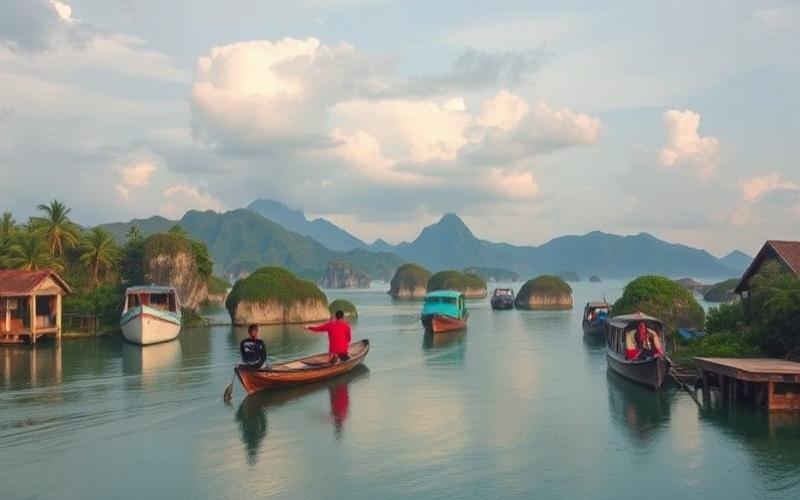
 Published on and written by Cyril Jarnias
Published on and written by Cyril Jarnias
Moving to Indonesia, this fascinating archipelago of over 17,000 islands, can be both an exciting and complex adventure. For foreigners wishing to live there, administrative procedures can quickly become a real jungle without proper preparation.
This article guides you through essential steps to obtain a visa, secure residency, and navigate various options available for expatriates looking to work or invest in this land of striking contrasts.
With a clear understanding of procedures, you can approach your new life in Indonesia with confidence and fully enjoy its rich and diverse culture.
Essentials for Obtaining a Visa in Indonesia
Types of Visas Available for Indonesia
| Visa Type | Duration | Primary Use | Extension Possibility | Single/Multiple Entry |
|---|---|---|---|---|
| Tourist Visa (VOA, C1, C211A) | 30-60 days | Tourism, family visits | Yes (1-2 times) | Single/Multiple |
| Business Visa (C2, D2) | 60 days | Meetings, conferences, prospecting | Yes (depending on type) | Single/Multiple |
| Temporary Residence Visa (KITAS) | 6 months-2 years | Work, investment, family, retirement | Yes | Single |
| Student Visa (C316) | Academic program | Studies in Indonesia | Yes | Single |
| Family Visa (C317) | 1 year | Family reunification | Yes | Single |
Eligibility Criteria and Required Documents
- Valid passport (>6 months from entry date, blank pages)
- Recent ID photos (standard format, light background)
- Proof of financial resources (bank statement or proof of means)
- Round-trip flight ticket
- Accommodation reservation or invitation letter
- International health insurance (often required for KITAS)
- Sponsor letter (for certain visas, particularly business and KITAS)
- Specific documents according to visa type:
- Employment contract, work permit (work KITAS)
- Enrollment certificate (student visa)
- Marriage or birth certificate (family visa)
- Company documents, business license (investor visa)
Application Process
Where and how to submit the application:
- Online via the official Indonesian visa portal (e-Visa)
- Indonesian embassy or consulate in country of residence
- Upon arrival for VOA (Visa on Arrival) at major airports and ports
Processing times:
- VOA: immediate upon arrival
- Online visas: 3 to 10 business days
- KITAS and long-stay visas: 2 to 8 weeks depending on type
Associated fees:
- VOA: approximately $35 USD
- Tourist/business visa: $50 to $100 USD
- KITAS: $1,000 to $2,000 USD (depending on category and duration)
- Additional fees for extensions and express service
Practical Tips to Avoid Common Mistakes
- Check passport validity before submitting application.
- Prepare digital and paper copies of all required documents.
- Carefully complete the application form without omissions or errors.
- Respect required formats for photos and scanned documents.
- Do not purchase flight tickets before visa confirmation (unless mandatory).
- Keep receipts and proof of visa fee payments.
- Ensure sponsor documents are signed and up to date.
Recent Legislative Changes
- Simplification of visa codes (e.g., consolidation of social visas C6, creation of C7C for skill demonstrations).
- Extension of e-VOA program to more nationalities and entry points.
- Increased quota and relaxed conditions for investor visa and “Second Home” visa (long-term residence).
- Updated requirements for freelance KITAS and retirement visa.
Resources and Assistance
- Official Indonesian visa portal: evisa.imigrasi.go.id
- Indonesian embassies and consulates
- Specialized immigration agencies and local law firms
- Online assistance platforms for expatriates (forums, specialized groups)
- Phone services and online chat on official websites
Note:
Always check updated requirements before departure, as rules can change quickly.
Preparing a complete and well-organized file greatly facilitates processing and avoids rejections.
Good to know:
Always check recent legislative updates regarding visas by consulting the official Indonesian embassy website and make duplicate copies of your documents to avoid any delays when submitting your application.
Practical Tips for Finding Accommodation
Types of Accommodation Available in Indonesia
- Apartments / Condominiums
Mainly available in major cities (Jakarta, Surabaya, Bali), they typically offer modern amenities: pool, gym, 24/7 security, parking. Luxury apartments sometimes include additional services like spa, cleaning, or playground. - Houses / Townhouses
Widely available, even in Jakarta. You’ll find single or row houses, often in Western or Indonesian style, sometimes with garden and pool. Furnished houses are more expensive but avoid furniture purchases. - Villas
Mostly in tourist areas (Bali, Yogyakarta, Lombok), these accommodations are spacious and luxurious, often equipped with pool, garden, sometimes including household staff and services. - Kos/Kost (rented rooms)
Very popular among students and young professionals, these are individual rooms in a house or building, with private or shared bathroom and common kitchen. Some kos offer additional services (laundry, cleaning). - Guesthouses/Penginapan
Similar to bed and breakfasts or small hotels, often rentable monthly with amenities like breakfast included.
Popular Online Platforms and Real Estate Agencies
- International platforms: Airbnb, Booking.com, Kayak, Cozycozy
- Local platforms: Rumah123, OLX Indonesia, Mamikos (specialized in kos)
- Local real estate agencies: Ray White, LJ Hooker, Century 21
- Expatriate networks and specialized Facebook groups
Average Prices by Region
| City/Region | 1-Bedroom Apartment (center) | 1-Bedroom Apartment (suburbs) | Kos/Kost (room) | Family House |
|---|---|---|---|---|
| Jakarta | $250–300/month | $140–200/month | $50–100/month | $300–1000/month |
| Bali | $200–350/month | $100–200/month | $50–150/month | $400–1200/month |
| Surabaya | $180–250/month | $100–170/month | $40–90/month | $250–700/month |
Luxury villas and furnished houses can significantly exceed these ranges.
Role and Reliability of Real Estate Agents
- Agents facilitate property search, viewing, and negotiation, especially for foreigners.
- To verify their reliability:
- Choose recognized agencies or those recommended by expatriates.
- Request professional card and verify physical presence of agency.
- Avoid advance payments without written proof or receipt.
Contract Verification and Legal/Administrative Aspects
- Always read contract carefully (in Indonesian and/or English).
- Verify duration, renewal terms, amount and conditions for security deposit return.
- Ensure the owner is the legal holder of the property (request copy of ownership certificate).
- Inquire about local residence rules, particularly for foreigners (some leases require police declaration or neighborhood approval).
- Take inventory of furniture if furnished accommodation.
- Prefer payment by transfer or check, never cash without receipt.
Practical Tips for Negotiating and Securing Best Conditions
- Compare multiple properties and don’t hesitate to negotiate rent, especially for long-term rental or during low season.
- Request inclusion of certain utilities (water, maintenance, internet).
- Negotiate addition or repair of equipment before moving in.
- Take photos of initial property condition during move-in inspection.
- Inquire about neighborhood and accessibility (proximity to transport, shops).
- Choose accommodation suited to actual needs (size, location, budget, duration, security).
Key Tips
- Clearly define needs and priorities (proximity to work, school, environment, budget).
- Check neighborhood reputation (safety, noise, flooding).
- Ask for recommendations from other expatriates or locals.
- Be vigilant about scams: prefer in-person visits and never pay without signed contract.
- Consider lease flexibility, some are very long (up to 3 years) but negotiable.
Essential Points to Remember
- Always visit property before signing.
- Read contract carefully and ask for clarification if in doubt.
- Negotiate rent and conditions.
- Ensure reliability of agent or owner.
- Adapt accommodation to needs and lifestyle.
Good to know:
Platforms like Rumah123 and Lamudi are ideal for comparing prices, which range from 3 to 5 million IDR per month for an apartment in Jakarta, while koskos are an economical option with prices starting at 1 million IDR; always check the real estate agent’s background and ensure the rental contract includes clear clauses.
Renewing Your Residence Permit with Ease
Steps for Renewing a Residence Permit in Indonesia:
- Check expiration date of current permit
- Initiate renewal at least 30 to 60 days before expiration to avoid overstaying.
- Gather required documents
- Original passport (valid at least 18 months for some permits).
- Current residence permit (KITAS/KITAP).
- Renewal application form (obtain from immigration office or online).
- Sponsor letter from employer or local guarantor.
- Recent ID photos (format required by immigration).
- Proof of address in Indonesia (rental contract, utility bill, etc.).
- Proof of renewal fee payment.
- Specific documents according to permit type (e.g., IMTA for work permit, business plan for entrepreneurs).
- Submit application at competent immigration office (Kantor Imigrasi)
- Visit the immigration office in your place of residence or employment.
- Submit all required documents.
- Complete forms on-site if necessary.
- Undergo photo and fingerprinting (biometrics, mandatory since May 2024).
- Tracking and receiving renewed permit
- You will receive a submission receipt.
- Track progress via official immigration website or through your agent.
- Collect renewed permit once application is approved.
| Document | Where to Obtain | Practical Tip |
|---|---|---|
| Passport | Embassy/Consulate | Check required validity |
| Renewal form | Immigration office / online | Request current version |
| Sponsor letter | Employer/local guarantor | Prepare template in advance |
| Proof of address | Owner/accommodation | Keep updated copies |
| ID photos | Local photographer | Follow required format |
Processing Times:
Generally, renewal takes between 3 business days and several weeks, depending on file complexity and immigration office workload.
Expedited processing may be possible for some electronic visas, but a standard timeframe of 5 business days is common for simple visas.
Complex procedures (missing documents, security check, biometrics) can extend processing times.
Involved Government Offices:
- Kantor Imigrasi (Local Immigration Office): file submission, biometrics, permit collection.
- Ministry of Manpower (for work permit/IMTA): validation of employment authorizations.
- Ministry of Foreign Affairs (for certain special visa categories).
Tips to Avoid Common Mistakes:
- Check updated document list before each renewal, as requirements change regularly.
- Do not exceed permit expiration date: irregular stay results in fines and complicates future procedures.
- Check passport validity: some permits require 18 to 24 months remaining validity.
- Always keep digital and paper copies of all submitted documents.
- Prepare recent photos conforming to local standards.
- Anticipate mandatory biometrics since May 2024.
- Use a specialized agent if uncomfortable with Indonesian administration.
Practical Tips for Expatriates:
- Schedule appointment online via official immigration website to avoid waiting at counter.
- Consult your company HR department or immigration agent for any legislative updates.
- Keep electronic copy of your KITAS/KITAP on your phone.
- Verify address of competent immigration office (proximity to your home or workplace).
- Stay informed of legislative developments: recent changes mandate biometrics for all renewals since May 2024.
Recent Legislative Developments:
- Mandatory biometrics since May 2024 for all visa/residence permit extensions or renewals.
- Strengthened controls on stay justification and financial capacity.
- Increased possibility to track file status online.
Key Takeaways
Renewing a residence permit in Indonesia requires anticipation, document accuracy, and vigilance regarding regulatory developments. Using online tools and agent support can greatly simplify procedures.
Good to know:
Ensure you check your permit’s expiration date to avoid penalties, gather necessary documents like your passport and KITAP, prepare for a 30-day processing time, and schedule appointments online with local immigration services; note that recent developments may require additional documents, so regularly consult updates and ensure you use the latest forms available on the official Indonesian government website.
Understanding Laws and Regulations for Foreigners
Foreigners wishing to stay and work in Indonesia must comply with several strict regulations. Here’s an overview of main legal requirements and procedures to follow:
Visa and Work Permit Regulations
- Work Visas: Foreigners cannot work with a tourist visa. They must obtain a VITAS (Limited Stay Visa) or ITAS (Limited Stay Permit) to work legally. VITAS is a limited stay visa, while ITAS is the limited stay permit itself.
- Work Permit (IMTA): IMTA is mandatory for working in Indonesia. It’s issued for maximum one year and can be renewed.
- RPTKA (Expatriate Placement Plan): Employers must submit an RPTKA to the Ministry of Manpower to justify hiring a foreigner.
Registration with Local Authorities
- Local Registration: Foreign residents must register with local authorities, typically at immigration office or local police.
- Residence Card (KITAS): A KITAS is required for stays over 30 days in Indonesia. It allows legal work when associated with an IMTA.
Specific Restrictions and Obligations
- Short-Term Stay: Short-term stays generally don’t require full work permit, but tourist visa may suffice for unpaid activities.
- Long-Term Stay: For longer stays, ITAS and IMTA are required. Foreigners must also meet certain requirements such as health insurance and local training quotas.
- Families: Families wishing to settle must obtain residence permit for each family member. Children must be enrolled in local or international educational institution.
Practical Examples and Tips
Required Documents for ITAS
| Document | Description |
|---|---|
| Passport | Valid for at least 18 months |
| Curriculum Vitae | Stamped by company |
| University Diploma | In English or Indonesian |
| Health Insurance | Mandatory for foreign residents |
| ID Photo | 4×6 cm format |
Procedure for Families
- Family Visa: Family members must obtain limited stay permit (ITAS) to live in Indonesia.
- School Registration: Children must be enrolled in local or international school.
- Health Insurance: Health insurance is often required for entire family.
To effectively navigate the Indonesian legal system, it’s advisable to seek a specialized lawyer or immigration consultant for personalized advice and to avoid administrative complications.
Good to know:
Foreigners living in Indonesia must obtain appropriate visa (e.g., KITAS for long-term stays) and register with Immigration and local police; for residents with family, dependent permits may require additional procedures. Be aware of differences between socio-cultural visas and work permits, and keep in mind that procedures may vary by region, so check with Indonesian consulate.
Disclaimer: The information provided on this website is for informational purposes only and does not constitute financial, legal, or professional advice. We encourage you to consult qualified experts before making any investment, real estate, or expatriation decisions. Although we strive to maintain up-to-date and accurate information, we do not guarantee the completeness, accuracy, or timeliness of the proposed content. As investment and expatriation involve risks, we disclaim any liability for potential losses or damages arising from the use of this site. Your use of this site confirms your acceptance of these terms and your understanding of the associated risks.






















